Current as of: March 3, 2026 - 14:33

Highlights of Cuba Trip Notes
- Ways to Travel: Guided Group
- Destination: Cuba
- Programmes: Culture
-
Activity Level:
2 out of 7 - Easy & Moderate
- 8 Days: Land Only
- Ages: 16+
- Trip Code: AUW
- Carbon Footprint: 20kg CO2e
Trip Overview
Discover the true Pearl of the Caribbean, from the iconic experiences to the stories of the local people
Explore Cuba, a land known for revolution and rum, salsa and cigars, classic cars and crumbling colonial towns. The whole truth, however, is far more eye-opening and evocative. Guided by an expert tour leader, we unpack it all. Of course, there’s the essential experiences: dancing salsa, making mojitos and relaxing on the Caribbean sands of Playa Ancón. But it’s through our countless interactions with the local people and nightly stays in Cuban guesthouses that we truly understand a culture forged under unique circumstances: welcoming, sociable and resilient, despite daily adversities.
At a Glance
- Accommodation: 7 Classic nights (Cuban guesthouses known as Casa Particulares)
- Group normally 4 to 16, plus leader. Minimum age: 16
- Tour enables legal travel to Cuba for US citizens under the Support for the Cuban People program
Is This Trip for You?
This trip is rated Activity Level 2 (Easy & Moderate). For more information on our trip gradings please visit the Activity Level Guidelines page. If you have any queries about the difficulty of the trip please do not hesitate to contact us.
Understanding Cuba: Cuba’s famously turbulent history and economic stagnation has resulted in daily difficulties: supermarket shelves can be bare, finding a working ATM is often tricky, wifi is unreliable and there are frequent power outages. Our tour leader helps to unravel the nuances and red tape of island life, allowing you to truly absorb this fascinating destination. We strongly recommend reading the Trip Notes carefully, there’s plenty of information in there that will enhance your experience!
Journeys: We travel in a private air-conditioned coach. The longest journey is seven hours on Day 3, and there is another long distance to cover on Day 6 (approximately five hours). Travel times can vary depending on traffic and weather.
Phone signal: Phone networks don’t make or receive calls particularly well in Cuba, and coverage may not be available in many locations. There is 4G but not all phone networks work here, so please check with your service provider before travel. Data roaming from your home network can be incredibly expensive – we recommend switching this off. There are several ways to connect to the internet using a mobile device, but it’s best not to expect a reliable internet connection. Most casas particulares have free wifi which, while much slower than your usual connection, is adequate for keeping in touch with friends and family via WhatsApp or email. If you have time, you could buy a Cuban sim card to access roaming; however, service is slow and it may take a couple of hours to buy and register your sim card.
Water safety: This trip includes time by a lake, river or sea, where there may be opportunities to swim. You should always seek local advice before deciding whether to swim. Open-water or wild swim spots should be treated with extreme caution. Information on how to keep yourself safe while swimming is shown here.
Group
The trip is led by an English-speaking Cuban guide, accompanied by a driver.
Adult min age: 16
Min group size: 4
Max group size: 16
Itinerary

Land Only
- Start City: Havana
- End City: Havana
Land Only Itinerary
Welcome to Havana, the lively capital of Cuba. Founded by the Spanish in the 16th century, it is now a soulful mix of colonial architecture, street troubadours and classic cars. We check into our first casas particulares of the trip; today is all about settling in and unwinding after your flight. Meet your tour leader and fellow passengers today at the start accommodation.
Accommodation: Casas particulares
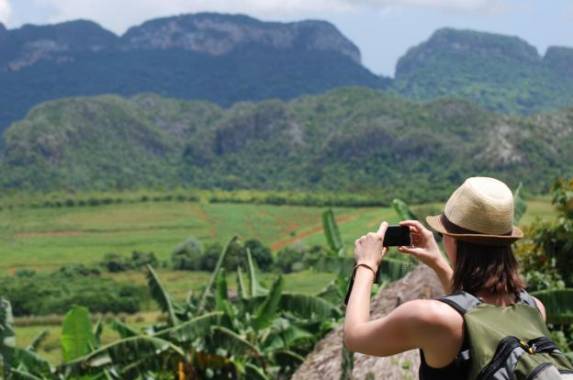
Today, we travel to the Viñales Valley in the west of Cuba. Famous for its rolling tobacco plantations and collection of limestone karsts, it’s easy to see why Viñales was awarded World Heritage status. Joined by a local resident, we walk through the Valley of Silence to soak up rural Cuban life as farmers tend to their crops using traditional farming methods. We also visit a tobacco farm to learn about the famous Cuban export and meet with a tobacco farmer to understand the growing process. After checking into our casas particulares, we visit a farm in the Viñales hills for a sunset dinner overlooking the valley.
Accommodation: Casas particulares
This morning, we have a long drive eastward to Playa Larga. We stop at a farmer’s house in the village of Palpite with the aim of seeing the smallest birds in the world, the bee hummingbird, who like to feed on the farmer’s patio. We are then joined by a local nature expert who introduces us to the natural landscape and characteristics of the area. We also visit a small community arts and dance school in Palpite to meet participants and learn about the importance of the arts in Cuba. If time, we can also enjoy a refreshing swim in the turquoise waters of the Bay of Pigs.
Tonight, we enjoy a traditional creole dinner followed by the quintessentially Cuban pastime of dominoes and rum.
Today’s travel time is approximately five hours.
Accommodation: Casas particulares
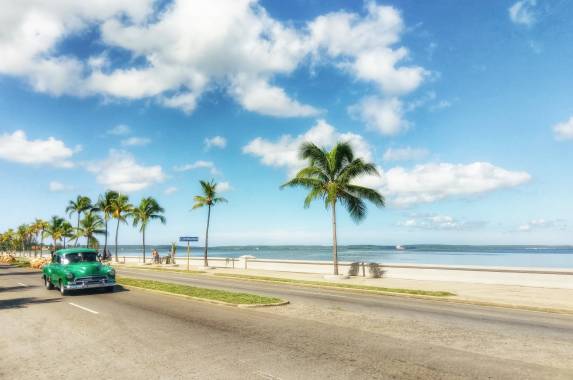
This morning, we continue eastwards to Cienfuegos, known as the Pearl of the South. Cienfuegos is a city full of architectural delights and Cuban spirit with a beautiful main square and restored buildings.
On arrival, we tour the city by e-tricycle, fun tuk tuk-like vehicles that can accommodate four people and run on solar power. Used locally as public transport, they provide an authentic way to see the city.
After, we depart Cienfuegos and drive down the coast to Trinidad, a World Heritage site since 1988 and perhaps the best-preserved colonial town on the island. Exploring Trinidad is like stepping back in time, the cobbled streets and horse-drawn transportation whisking you back to the Colonial era. There are many interesting museums in old colonial buildings and music drifts through the streets and plazas, bringing the town to life. We have a walking tour to learn what it’s like to live in Trinidad, which includes a visit to Casa Templo de Santeria de Yemaya where we learn about Santeria, an Afro-Cuban religion.
This evening, we meet a local barman at a private paladar who is an expert at mixing the perfect mojito! We learn how to mix mojitos in the authentic Cuban way then enjoy dinner at the paladar before returning to our casas particulares.
Accommodation: Casas particulares
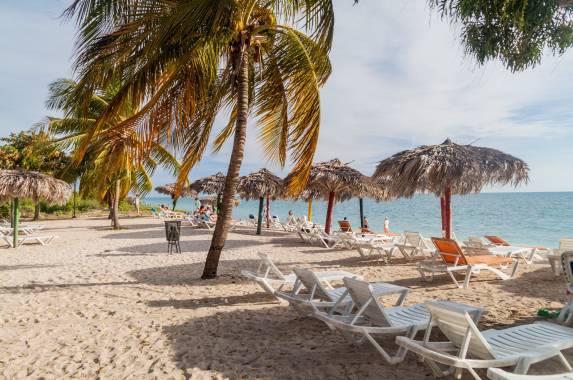
This morning, we transfer to Playa Ancón, making a short stop to visit the picturesque fishing village of La Boca. This is a popular spot with local fishermen, who we meet and speak to about the fishing industry in Cuba. Then we carry on to Playa Ancón and enjoy time at the beach. It is a great place to swim or you can simply dip your toes in the water and relax. After, we have an authentic Cuban lunch prepared for us.
On our return to Trinidad in the afternoon, there is the option to take part in a salsa class, learning the fundamentals with Cuban dance partners. Trinidad is known for its nightlife, so after we’ve learnt the salsa basics, we visit Casa de la Trova, a legendary live music venue, to listen to local musicians playing authentic Cuban music. This venue is always lively and sociable, with plenty of Cubans keen to let us improve our moves with them!
Accommodation: Casas particulares
Leave Trinidad after breakfast and head to Manaca Iznaga, where we visit a project that showcases the skilled process of making textile handicrafts. Manaca Iznaga and the surrounding Valle de los Ingenios was a hugely important sugar-growing area in the 18th and 19th centuries and we learn about that history here. As we have a long transfer today, we take packed lunches from our accommodation.
We also visit a country farm where you can enjoy a cafecito (Cuban coffee) and learn about the crops grown in the area. As well as being welcomed into their house for a cafecito, we have a short walk around the property with the owners, learning about small-scale agriculture techniques and industry in rural Cuba.
Our next stop is Santa Clara, the site of the last battle of the Cuban Revolution in December 1958, just before Fidel Castro took Havana. Che Guevara and his troops ambushed an armoured train carrying arms to Santiago de Cuba and this was a major turning point in the Revolution. We visit the Mausoleum of Che Guevara and his comrades who died in Bolivia before driving back to Havana.
Today’s travel time is approximately five to six hours.
Accommodation: Casas particulares
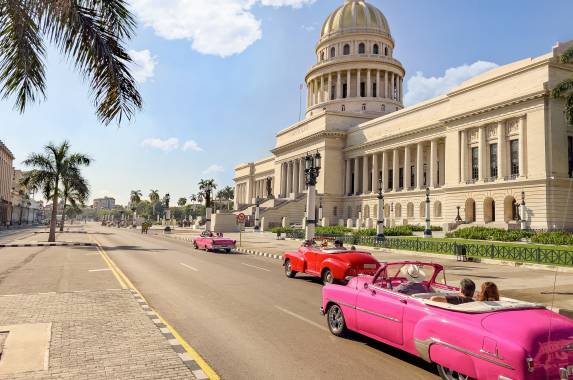
This morning, we have a walking tour of Havana, the capital and largest city in Cuba. We walk the streets of Old Havana, often described as a living museum with magnificent monuments, cathedrals and palaces, as well as seeing the famous Capitolio building and four of the city’s principal squares. During our tour, we also visit a ration store, food market and artisan market.
There is no better way to see Havana than by classic car. This afternoon, we get acquainted with both the old and new areas of the city in pristine classic cars, discovering the distinct areas of the capital and stopping at points of interest for explanations and stories. Stops include the historic Plaza de la Revolución and bustling Vedado district.
Our final dinner is at a private paladar, run by an entrepreneurial chef who pioneers a fusion of Cuban and Asian cuisine.
Accommodation: Casas particulares
This morning is free to relax or do some last-minute sightseeing in Havana Old Town before we bid a fond farewell to each other and begin our return journeys home.
Accommodation
Casas particulares: a uniquely Cuban experience
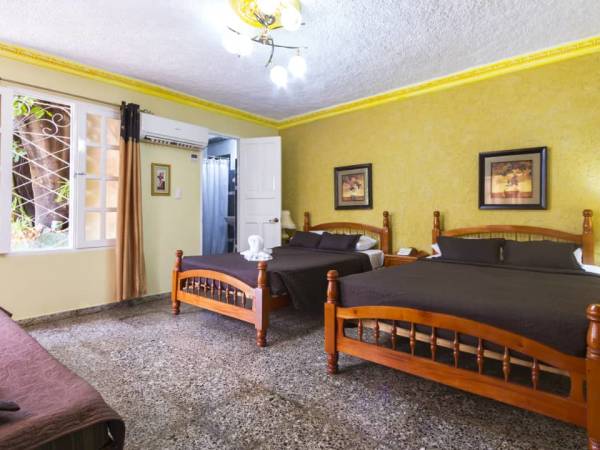
We stay in casas particulares, guesthouse-style accommodation that provides a unique insight into local life – an experience you just wouldn’t get in a traditional hotel!
Understanding casas

Casas are privately owned homes with rooms to rent. Some call them Cuba’s answer to the B&B, but the truth is they offer a far more personal experience. Typically, the owner (and often family) will live at the property, meaning you have meaningful interactions with them as soon as you wake. The hosts are warm, welcoming and gracious – expect generous breakfasts, plenty of smiles and friendly conversations in Spanglish. Who knows, you may make a friend or two!
The properties we use have been handpicked by our local team and come in a variety of shapes and sizes, reflecting the personality and lifestyle of the owners. As family homes, they tend to have a maximum of three or four bedrooms each, so we often use several different properties in close vicinity to accommodate our group. We do our best to ensure those in single-room accommodation are within a house where other group members are staying.
The rooms are often vibrant, simply furnished and with tiled floors, sometimes with wooden shutters in place of windows. All have air conditioning and a private bathroom.
Worth knowing
- Power cuts are part of daily life in Cuba, so please prepare for blackouts that may last several hours. Please bring a torch (flashlight) with you in case of evening/night-time occurrences. Also pack mosquito repellent for these periods – you’ll want to open your window, too.
- Internet connections can be unreliable.
- Hot water supplies are not always guaranteed and water pressure can be temperamental.
- Casas do not have lifts (elevators) so you should be able and prepared to carry your luggage up stairs.
- Many casa owners can help with laundry for a small fee.
- Most casas do not have hairdryers.
- There are often pets (a cat or dog) at the casas – please advise at the time of booking if this is problematic.
Single supplement from USD 532
Food & Drink
All breakfasts, two lunches and four dinners are included.
The paladares are likely to be a highlight of any visit to Cuba – they are one of the few types of private enterprise allowed (although still heavily regulated). Think soul food – rice, black beans, slow-roast pork or chicken, fresh fish, lobster and plenty of tropical fruit. The atmosphere in private paladares and the opportunity to integrate with Cubans will absolutely enhance your stay!
In general, Cuba is not renowned for its culinary excellence (although it is improving) and some ingredients are just not possible to acquire. Food tends to be simple and relatively expensive – in no small part due to the long trade embargo implemented by the US. Dishes tend to be simple, with most mealtimes consisting of meat or fish accompanied by rice and salad or vegetables. Seafood is widely available on the coast, including cheap and abundant lobster! Vegetarians will find that choices are limited, but it’s still possible to eat well. Snacks are not freely available in Cuba so you may wish to bring some with you – particularly energy snacks, as food shops, cafes and restaurants are scarce in many of the rural areas we visit. It can be difficult to find quick lunches on the go as Cubans typically eat two meals a day – we provide packed lunches during the day and there are plenty of water and fruit refreshment stops. While food choice can be basic, on the plus side there is absolutely no shortage of rum! Havana Club, Black Tears, Ron Santiago, Caney… after your visit, you will be an expert.
Some drinking water is available on the bus, but we ask that you bring a filter water bottle to refill at public fountains and taps along the way. This helps to cut down on plastic and the need to buy water.
Transport
We use a private, air-conditioned coach throughout the tour. Bicitaxis and classic cars do not have seat belts; however, as noted below, we have approved their use for these specific journeys.
Weather & Seasonality
The dry season runs from November to April (with December to March being the peak months for traditional tourism). It is very humid between May and October, with heavy rains at times and the possibility of hurricanes. July and August are some of the most popular months but are hot (average 28C/82F) and wet. Cuba has an average of six hours of sunshine per day with a more or less constant humidity of 62 precent. Water temperature is normally 24C-28C (75F-82F).
Joining Instructions
Key information
Start accommodation: Casas particulares in Havana
Recommended arrival time: You can arrive at any time today. The welcome briefing often takes place in the morning of Day 2, due to the evening arrival of many flights
Airport: Havana (HAV)
Getting to the start accommodation
The start accommodation is approximately 35 minutes from the airport. Exodus provides free arrival transfers to the start accommodation from the airport for all customers arriving on the start date of the trip (customers arriving earlier than the start date may take a taxi or book a private transfer). If you would like further information on joining this trip, please speak to your sales representative.
Catching your return flight
Exodus provides free departure transfers for all customers departing on the last day of the group trip to Havana Airport (HAV) from the end accommodation.
Please note, unless specified otherwise, the transfers will be to the start accommodation and from the end accommodation and will be on the date on which the tour starts/ends. Transfers should be booked with your sales representative at least two weeks before the tour starts.
Full joining instructions including local emergency numbers will be sent to you as part of our Final Joining Instructions. If you do not receive these at least a week before departure, or require them earlier please contact our office or your travel agent.
Location start: Havana
Location end: Havana
What To Take
Essential Equipment
- Filter water bottle (Exodus has partnered with Water-to-Go, a filtration system that eliminates more than 99.99 percent of all microbiological contaminants from any non-saltwater source. Exodus customers can claim 15 percent off their first order, and better still, 15 percent of the purchase value is donated to the Exodus Travels Foundation)
- Sunglasses
- Sunhat
- Sunscreen
- Waterproof rain poncho or waterproofs
- Sports shoes
- Swimwear
- Torch (flashlight)
- Insect repellent
- Hand sanitiser
- Power bank (useful during the frequent electricity blackouts)
- Light clothes that cover the legs and arms to wear in the evenings: this will help to prevent the mosquitoes biting.
Please note, GPS devices, including GPS watches, are subject to import restrictions. Ensure you do not bring them into Cuba. Mobile phones, tablets and laptops can be brought into the country, but any inbuilt GPS must be switched off.
Spare space? If you have room in your luggage, consider bringing items to donate to schools and villages − your tour leader can assist in delivering them once you’ve arrived.
Much-need items included:
- Second-hand clothing in good condition, including children’s shoes
- School stationery, including pens, pencils, crayons, erasers, rulers and notebooks
- Card games
- Balls, including (deflated!) footballs and tennis balls
- Toiletries and first-aid, including sanitary products, sunscreen, painkillers, antihistamine, insect repellent, hydrocortisone cream, razors, toothpaste, toothbrushes, deodorant and soap
Practical Information
Passport
Check the expiration date of your passport if travelling internationally. Many countries require your passport to be valid for at least six months after the date of your scheduled return, and to have at least two clear pages for entry stamps.
Visa
Cuba
UK, EU, Canada, Australia, New Zealand or Japan passport holders residing in the UK/Ireland
If you hold a passport from the UK, an EU country, Canada, Australia, New Zealand or Japan AND reside in the UK/Ireland, Exodus will arrange your visa for you. We will provide paper visas until June, then e-visas after.
Please note, Exodus cannot supply a visa if you are travelling from or via the USA. In these instances, we recommend using cubavisaservices.com.
Other passport holders residing in the UK/Ireland
If you reside in the UK or Ireland but do not hold one of the above passports, please contact your nearest Cuban consulate to check which visa is required – Exodus is unable to provide a visa for you.
Customers residing outside the UK/Ireland
If you do not reside in the UK or Ireland, you must contact your nearest Cuban consulate to check which visa is required – Exodus is unable to provide a visa for you.
USA passport holders and residents
Any USA passport holder wishing to travel to Cuba should be fully aware of current legislation before committing to a trip to Cuba. As an American-owned company, Exodus programs to Cuba are fully compliant with the US Treasury’s Office of Foreign Assets Control (OFAC) general license under the Support for the Cuban People category of travel.
Travellers from the USA are required to obtain an e-visa for travel to Cuba. Please first check with your airline if the e-visa is included as some airlines include it in the airfare. If it is not included, you can apply for an e-visa at www.cubavisaservices.com. The cost as of November 2024 is $50 for the e-visa plus a $35 processing fee.
You must keep a copy of your itinerary and any correspondence/transactions relating to the trip for a minimum of five years after the trip takes place to comply with OFAC requirements. For more information about the Support for Cuban People and OFAC requirements, visit: www.travel.state.gov/content/travel/en/international-travel.html.
Canada passport holders
Please visit https://travel.gc.ca/destinations/cuba for more information on securing your visa.
IMPORTANT FOR ALL CUSTOMERS:
Cuba now requires all passengers to fill in a locator form prior to travel – this form is mandatory. You can access the form here: www.dviajeros.mitrans.gob.cu/inicio Make sure to keep a photo of the QR code generated so you can easily present it on arrival. You can only fill in the D’Viajeros form within seven days prior to entry into Cuba. For advice on how to complete it, consult our Help Sheet.
The Cuban entry immigration is time consuming, and most visitors encounter delays: it may take up to two hours to clear immigration and collect your bags. All tourists visiting Cuba must have travel insurance to cover medical costs. You may be asked to provide proof of your travel insurance policy when you arrive at Havana Airport. Ensure your documents are easily accessible.
Visa requirements often change and it is your responsibility to organise this element of your trip. We recommend that you check with the nearest embassy or consulate of your chosen destination(s), including any countries you may be transiting or transferring through. You should also check with your airline to see if the e-visa is included, as some include it with the airfare.
Vaccinations and Health
Cuba
There are no mandatory vaccination requirements. Recommended vaccinations are: Tetanus, Hepatitis A.
It is essential you protect yourself against mosquito-borne viruses, including dengue, zika, chikungunya, and oropouche. We are advised that there is no risk of malaria.
Steps to take:
- Apply tropical-strength insect repellent regularly, especially two hours after dawn and at dusk
- Wear light, long-sleeved clothing in the evenings
Our itineraries avoid areas with poor sanitation and stagnant water, so the risk is low if these precautions are followed. Mosquitoes are more common in low-lying terrain, including urban areas, so mountain regions pose much less risk, but repellent is still recommended.
The above information can change at short notice; as we are not qualified to answer all your questions about travel health we strongly recommend you contact your Medical Professional or a Travel Health Clinic at least eight weeks prior to departure for up‐to‐date information.
Local Time
Cuba's time zone: America/Havana (UTC -05:00)
Electricity
Cuba's electricity: Plug type A (mostly 110V) or Plug type C (220V)
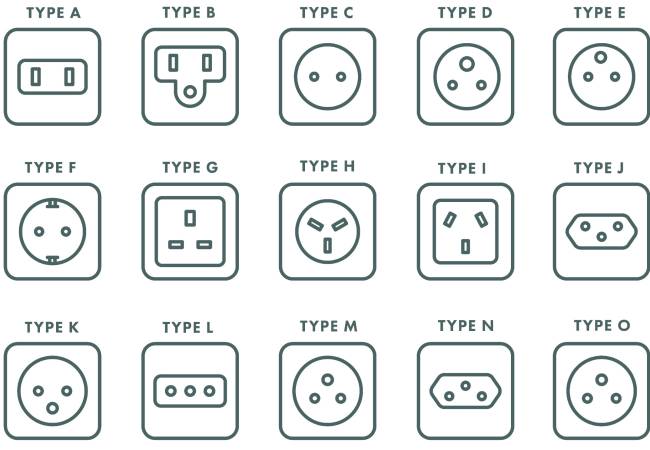
Money
The national currency of Cuba is the Cuban peso (CUP); however, euros and US dollars are the preferred currencies outside Havana. We recommend bringing cash (euros or US dollars) with you and exchanging with your tour leader.
- In Havana: Businesses (restaurants, cafes etc) only accept Cuban pesos
- Outside Havana: Euros or US dollars are the preferred currencies
Please note, credit/debit card acceptance is limited across the country. Additionally, businesses throughout Cuba may not have much change so it’s best to carry and pay in small notes. If change is available, it will likely be given in Cuban pesos.
Currency exchange
If you’d like to exchange euros or US dollars, your tour leader can advise on the best place. It’s best to bring new, unmarked notes and change only a small amount for the first few days. Canadian dollars, British pounds and Australian dollars are exchangeable in the CADECA exchange offices, but euros are preferred.
Please also note that it is prohibited to enter or leave Cuba carrying Cuban pesos. Please make sure you have spent or exchanged any remaining pesos prior to passing through immigration on departure. We recommend you exchange them before reaching the airport as queues can be long. Limits may be applied on the maximum number of pesos to be exchanged into another currency. Any drinks, snacks, duty-free and souvenirs will then need to be paid for using a credit card or cash.
ATM Availability
Bring cash to cover the vast majority of your spending, as ATMs (which are rare, even in the larger cities) are regularly out of order and offer a poor exchange rate. Debit and credit cards can only be used in some shops, in hospitals and at duty free on departure.
Using cards for banks that are fully or partially US-owned is not possible in Cuba. Australian and Canadian travellers in particular should check with their banks prior to travel.
Extra Expenses & Spending Money
Drinks are generally around €2-€5.
Many travellers find Cuba more expensive than they expect (particularly Havana) and we recommend you bring more spending money rather than less. We recommend €350-400 per person for the week (not including tips for the guide and driver). Small denominations are preferred and can easily be spent in restaurants and bars.
If you wish to take part in the optional salsa class on Day 5, the cost will be between €10-€15, depending on the number of people participating.
Tipping
If you are happy with the services of the guide and driver, we recommend a tip of around €30-€40 per passenger for the week, which you can divide in favour of the guide.
Tipping is at your own discretion but is very much part of the culture in Cuba and is usually expected. Your tour leader will offer to arrange and look after a group tipping kitty, which is used to tip local guides at individual museums and attractions, musicians and waiting staff for included meals etc throughout the trip. The guide will usually collect around €30 from each group member at the start of the trip to cover this.
Tipping is also expected in restaurants – add about 10 percent to the bill.
Sustainability and Impact
As a certified B Corp, we’re on a mission to improve our social and environmental impact across all our adventures.
We do this through our innovative Thriving Nature, Thriving People plan.
This ‘nature positive’ approach is designed to help nature and communities thrive in harmony through practical solutions, such as reducing carbon and waste on our trips, supporting conservation projects through the Exodus Adventure Travels Foundation, and rewilding 100 square metres for every Exodus traveller.
Important Information
Your Safe Participation
When booking this trip, you should be confident in your ability to participate in all activities described in these Trip Notes. If you have any doubt about your suitability, please call us and ask to speak to one of the experts on this itinerary.
Although our leaders are well trained to deal with different capabilities, if they have any concerns about someone’s ability to safely take part in an activity, or their impact on other people’s enjoyment, we authorise them to take necessary action which, in some circumstances, may involve asking someone to miss that activity.
By booking this trip you agree to our Booking Conditions which clearly state that our leaders have the authority to do this. In these rare instances we will ensure anyone sitting out is safely provided for and offered alternative options where possible. Refunds will not be provided for activities missed and customers may be liable for additional costs incurred.
Seatbelts
All vehicles used by us should be equipped with working seatbelts, except where approved by us based on the vehicle type or journey. Wherever seatbelts are available, we require our customers to use them for their own safety, even where it may not be a legal requirement.
Travel Safety
For additional information please have a look at the travel safety advice page on our website.
How to Book
Speak to our friendly team of experts to plan your adventure:
- Check availability: our website shows real-time availability of our guided group tours, or contact our team by phone, email or live chat.
- Hold a space: You can provisionally hold a space on any guided group tour to give you time to finalise your travel plans.
- Confirm your booking: Payment of a deposit will complete your booking and secure your place on the trip.
After booking
You will receive a confirmation document and invoice, which includes extra information and guidance about your travel arrangements. Our dedicated Customer Operations team will help you with any pre-travel questions or arrangements and can easily add extensions or extra accommodation to your booking. Final Joining Instructions will usually be sent out two to three weeks prior to departure.
Adding transfers to your booking
If you have arranged your own flights and would like to add transfers to your booking, please provide your arrival and departure details to our Customer Operations team around four to six weeks before departure.
- Where free transfers are included, they are available for any flight but can only be added to your booking once we have received your flight schedule.
- Where group arrival and departure transfers are available, these operate at fixed times. You will need to arrive in time to meet the scheduled transfer. If the timings don’t align with your travel plans, our team can arrange private transfers once they receive your flight schedule.
Trip Note validity
Trip notes may be updated after booking; if any updates significantly impact the inclusions or itinerary you will be advised in writing. A link to the most up-to-date Trip Notes will be sent out with your Final Joining Instructions before departure.
The information in these Trip Notes is given in good faith. All holidays can be subject to unexpected changes, and occasionally it may not be possible to follow the itinerary as planned. In these circumstances we will make the best-possible alternative arrangements that maintain the integrity of the original itinerary.

